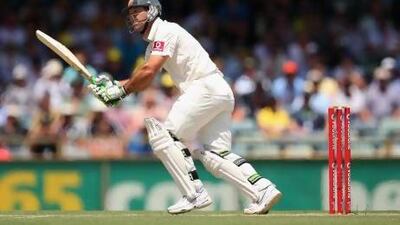Maybe a decade or so ago, if Jacques Kallis had swept Ricky Ponting off his feet in the manner that he had in Adelaide last week – and in terms of romance, the bowled was like a flying kiss in achieving its aim without contact – the world would have sniggered collectively.
But in 2012, as he improbably fell chest and face first to an outswinger, it was hard not to feel some warmth for him.
In those years, Ponting's sneering sense of superiority was so emblematic of the wider, distasteful swagger of Australia, that an inversion of the Cardusian principle of support was natural: Australia could win if they wanted but dear God, let Ponting fail.
An admission here: Ponting's batsmanship always left me a bit cold. His pulling was awesome and destructive, but you can say that about tanks as well. Usually it needed a great bowler to elevate it beyond. His lunge forward to drive, simultaneous to an early, abbreviated back-lift, was better because it allowed the belief that Ponting was vulnerable to creep through. He could be, and often was, dismissed like this.
And this was vitally important because at his peak, especially in Australia, there was simply no element of doubt or risk about his batting. Ponting scoring big runs was the only by-product of his presence at the crease. Of course that is greatness, but as spectacle?
The context of most of his innings was that Australia were great and Ponting was great, too.
Dominance is appealing only to the dominator. Where was the tightrope Brian Lara tread, walking out every innings holding a gun to his head and only one chamber bullet-less, for a side wrapped and waiting in dynamite, snipers awaiting outside? And coming out, handsome and alive? Or the loneliness among a billion of Sachin Tendulkar? Even Inzamam-ul-Haq's battle against his own overbearing inertia was compelling.
But being part of a great Australian side, after a while of all the acclaiming and praising and appreciating, the natural correction was to tend towards deflation with Ponting (especially if inflation was going to decree that Matthew Hayden be considered a great). Every time Ponting walked out, the best bowlers were already on his side and invariably the openers would have given him a start.
None of this made him any lesser than his contemporaries, but perhaps the assessments were less rigorous than they should have been. How abysmal, for instance, for such a batsman was his record in India (average of 26, 14 Tests and 25 innings and just one hundred)? For some reason, it was always made out to be a little less abysmal than the correspondingly poor record of a subcontinent batsman in Australia, or South Africa.
The late Peter Roebuck's infamous call for Ponting to be dismissed as captain at the start of 2008 may have been a little over-egged but it caught a little of the mood outside Australia about Ponting, Australia and their unhealthy machismo.
And it may have been after this point that the fire in Ponting's public persona seemed to dampen a little; was it Roebuck's piece? Probably not as much as it was Australia's difficulties in adjusting to life after Glenn McGrath, Shane Warne and the rest of them, or the fact cricket was changing. Ponting, wrinkled, losing hair, became a little more statesmanly somehow.
So it was actually from defeat - figurative, not literal - that a new appreciation emerged of Ponting, not maybe his batting as much as his person, now pushed along by a little humility, less bluster. There was the widely-appreciated 156 at Old Trafford to secure a draw against England, in which Australia's celebration was a symbolic defeat.
There was another, a double hundred and a forgotten one – and there are such things in Test cricket – in Hobart, in his home state of Tasmania. The circumstances of the Test, the series, even the opponents are not worth anything; it was a dead rubber game, Pakistan's attack was spicy enough but the side's spirit completely wrecked.
Instead through that Australian summer, it looked like time had not only defeated Ponting's batting, it was now mocking him by fading his ability to pull. Twice in that series he had been out pulling, first-ball at Sydney. And fourth ball in Hobart, he pulled again, top-edged it and was dropped at deep fine leg by Mohammad Aamir.
But rather than put it away, he kept pulling and especially through his first fifty where he did it so often he seemed to be proving a point, or parodying himself.
The point was not proved because he was pinged on the helmet once, bottom-edged a couple of attempts, pulled out of a few at the very last and the bowlers weren't especially quick.
Eventually he compromised, settling down for nearly nine hours, in which he only looked like the old Ponting towards the second half. There was something human in failing to control an ego that insisted he keep pulling, in finding ways around imperfections, in fighting his age.
The battle was gone by then – he would make only two more hundreds and averaged 34 thereafter – but in continuing to fight, to struggle, to falling over to outswingers, Ponting became real and not just a figment of Australia's domination.
Follow us

